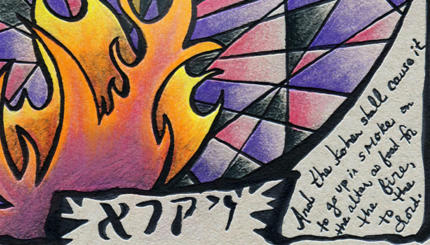When we open our eyes in the morning, when we are confronted with challenges, when we seek to create beauty, when we seek understanding and insight, encouragement and wholeness and some reasonable assurance that we need to accomplish our goals – we also seek inspiration.
We call on our acquired knowledge and experience. We see the paths we have walked, and places we have stumbled, and succeeded. We count on these experiences to help us make current and future decisions. Yet, there are times when our experience does not serve us. Innately, we know that when we look back we are very likely to recall our emotional responses. The reality of the moment is only a flickering shadow. When we examine our past actions in detail, it becomes clear that they are exactly what we have to transcend.
It is our spiritual resources – our hearts and souls, our loved ones, our faith that serve us best as we discern not only where our hearts are calling us, but how to move forward in wholeness.
Tradition tells us that on these Days of Awe the gates of the heavens open so we can meet with God panim al pamin – face to face – so we can face our misdeeds and cleanse our souls before the closing of the gates on , finally able to live in closer harmony with the One Who Spoke and All Things Came to Be and, so, in closer harmony with one another.
This essential desire for wholeness brings us from the four corners of the earth – and the four corners of our lives – on these days each year. We come together in a synagogue, a place that is unlike any other place in the world, where we one needs to explain nothing. Our presence reminds us, and one another, that we are all strivers, just the same as all Jews throughout the world, and throughout all time – past, present and future.
Together, we are a testament to Judaism – to its longevity, to its purpose, to its truth. Together, we are Am Yisrael – the people Israel, beloved of God, whom we serve. No one is greater or lesser than any other. We are all b’tzelem Elohim – cast in the mold of God. We remind ourselves that we are, at our core, in our essence, Jews, and the context of our relationship with God is dependent on our relationships with one another and our tradition – because it makes us who we are.
We stand together in testament to God – the same God Abraham blessed, to whom Hannah prayed. The God who blessed Jacob to open his eyes to what was all around him. The God who set Moses alight with a fire within – This is the same God who blesses us.
But… how will we pray? How will find the inspiration to lift the letters off the pages and turn them into prayers that will rise hashamaymah – heavenward? How can we pray to God when we don’t really understand God? In truth, I do not think needs us to understand. But we need to pray.
In the words of Rabbi Samuel Dresner – a disciple of the great Jewish philosopher, Rabbi Abraham Joshua Heschel:
In prayer, we open ourselves in surrender to God’s judgment. We often repress our real thoughts and what is truly in our hearts. Pent up little chambers firmly bolted against the curious gaze of the world are the actual hopes and fears of our lives. Much pain and suffering come from the hiding of our real selves in the subconscious of our souls when we refuse to share our problems with others for fear they may think less of us. In prayer, we find a release for what is stored within us. What we can say to no human being, we can say to God. What we must hide from the eyes of man we can reveal to God. What has burned within us during hours of anguish can be brought forth and laid upon the alter of the Eternal’s presence.
We may be inspired by the words on the pages and raise prayers that will resound through the universe. Or, we may not utter a sound and yet fill the heavens with all that we have held in our hearts since last Yom Kippur in our hopes to make our way in the world doing the least harm – and the most good – that we can.
We will pray to the One who knows our hearts better than we do. The One who knew us before we were knitted in our mothers’ wombs, who has accompanied us on the paths we have walked in ease, and those on which we have stumbled. We pray to the One who created the universe – and our souls, and whose glistening presence reminds us we are never alone. We pray to open the closed places of our hearts and allow peace can enter them so our hearts will be filled with peace as the universe if filled with stars.
And knowing this is inspiration enough.



